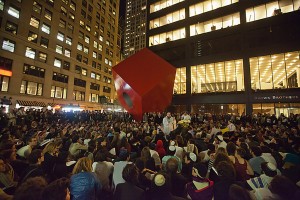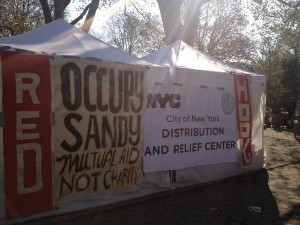An Activist on Occupy, Two Years After Zuccotti Eviction
Recently, as I tried to figure out how to mark the High Holidays in a way that resonated with my September state of mind — exhausted yet hopeful — I found myself saying, “I wish they could do Occupy Rosh Hashanah again.” It wasn’t the first, nor the last time over the past two years I felt wistful in this particular way, and began mentally willing the crowds back to Zuccotti Park.
Occupy Wall Street took root in southern Manhattan around Rosh Hashanah 2011, and the encampment was gone by Thanksgiving, brutally evicted in a police action that resulted in the destruction of hundreds of books, something that should have provoked outrage more than it did.
During those heady two months, I was an observer, reporting on gender in the movement for the progressive media, but also a participant. Because of Occupy’s seductively amorphous nature — Was it a state of mind? An organized movement? A disorganized movement? — the lines were blurred, wonderfully so. A delirious hope resided in my heart each cold autumn morning as I woke up, grabbed my camera and recorder, and jumped on the train to Wall Street. That hope was present also on the days when I just sat at my desk and aggregated news from the marches and direct actions around town and the country. Something was happening. Something was changing. After kvetching about my generation’s apathy for my entire adolescence and early adult life, I suddenly had nothing of the sort to kvetch about.
During Yom Kippur, thousands of people prayed publicly in the streets of the Financial District, their lamentations a form of protest. They asserted their Judaism and humanity far away from synagogue dues and curtains separating the genders. That’s what I longed for this year.
Later a few enterprising souls erected a sukkah as a way of testing NYPD rules against tents. This kind of project summed up the spirit of Occupy — thoughtful, creative, cheeky and defiant, a perfect balance of in-person confabulation and virtual symbolism. Even social media was less insufferable. Twitter became a vehicle for information about actions, arrests, documenting police brutality, even thoughtful disagreements. Facebook was a place where onlookers around the country could express solidarity with the spirit of insurrection and declare that they, too, were fed up with the status quo.
That November night after the eviction, tens of thousands of us gathered for a defiant march declaring, “You can’t evict an idea whose time has come.” Indeed, for months, the fabled “movement without a leader” lurched forward sans physical home. But, to sum up a nuanced history quickly, a combination of residual trauma from the eviction and internal issues over housing and power dynamics led to a gradual dissipation. Similarly (again, I’m generalizing) many other movements of resistance around the globe – Occupy was a tiny spoke in the wheel of 2011 activism — have also faded or devolved into violence.
Dedicated activists from Occupy have gone to work for unions and other agents of change — organizing against Stop and Frisk, organizing to get progressives like Bill de Blasio and Letitia James elected. Some have re-entered the system, getting jobs and apartments, others have exited further. Two women I met during the protests traveled around the country documenting resistance locally.
No one has successfully re-sparked a revolution.
The most sobering lesson Occupy drilled into me is that capitalism has its tentacles everywhere. We operate under a sociopolitical system best designed to exploit the worst tendencies of human nature, our greed and selfishness. It exists within us and without us, and we can neither just focus on self-improvement nor on changing the system’s structure. We have to do both. The Occupy maypole, carried through the throngs, read: “all our grievances are connected.” This is a lesson so hard to absorb in a movement where people mess up constantly. Various factions of activists and good-hearted people snipe at each other, demanding precedence for one issue over another. The idea of scarcity is a hard one to shake.
And yet, despite internal squabbles and state suppression, Occupy has another more uplifting lesson to teach. We never know what small acts of resistance will create that proverbial spark. A campout on the sidewalk. A refusal to budge. Two years later, Occupy reminds us that we have to think big, think together, and keep the slogan in our minds, even when it seems far from reality: another world is possible.
About a year after Occupy left, Hurricane Sandy came. In the water’s wake, the housing projects of Coney island and the Rockaways were strewn with debris, dirt and sand and the useless castoff clothes of the city’s wealthier citizens. The question of who had electric power after the storm ended up reminding us who really had power writ large; it opened the nation’s eyes to economic and social injustice in a more troublingly visceral, less symbolic way than Occupy did.
Sandy laid bare the divide between the two New Yorks that Bill de Blasio later made into a winning campaign talking point. Agencies and private charities foundered, but Occupy networks sprung into action again to provide relief. Those who had led direct actions and those who never set foot in Zuccotti strode together through the parking lots of churches on Long Island and Staten Island, and the synagogues in Brooklyn, directing emergency bottles of water along human conveyor belts. The message was clear: we remain a broken society. Yet many of us still want to fix ourselves.
Sarah Marian Seltzer is a journalist and fiction writer based in New York City. Her work has appeared in Ms. Magazine, the Washington Post, the Hairpin and the Forward, among other places. Find her at www.sarahmseltzer.com and tweeting too much at @sarahmseltzer. She is also on Zeek’s board.
![[the current issue of ZEEK]](../../image/2/100/0/5/uploads/leftistethicistgraphic-52842c6a.png)
- 5000 Pages of Zeek
- Founded in 2001, Zeek was the first Jewish online magazine, and we have over 5000 pages online to prove it, all available free of charge. Read more in the Archive.
More articles by
Sarah Marian Seltzer
More articles in
Life and Action
- Purim’s Power: Despite the Consequences –The Jewish Push for LGBT Rights, Part 3
- Love Sustains: How My Everyday Practices Make My Everyday Activism Possible
- Ten Things You Should Know About ZEEK & Why We Need You Now
- A ZEEK Hanukkah Roundup: Act, Fry, Give, Sing, Laugh, Reflect, Plan Your Power, Read
- Call for Submissions! Write about Resistance!





